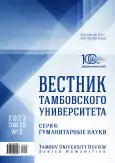Participation of the Tambov governorate militia in the fight against peasant insurrection. 1918–1922
- Authors: Bezgin V.B.1, Parakhin S.A.1
-
Affiliations:
- Tambov State Technical University
- Issue: Vol 28, No 2 (2023)
- Pages: 491-500
- Section: NATIONAL HISTORY
- URL: https://bakhtiniada.ru/1810-0201/article/view/298003
- DOI: https://doi.org/10.20310/1810-0201-2023-28-2-491-500
- ID: 298003
Cite item
Full Text
Abstract
Importance. The scientific problem is to study the activities of the Tambov governorate militia of the period 1918–1922 as a repressive body of the Soviet management system. The purpose of the research is to analyze the participation of county police departments in the suppression of peasant protest during the Civil War.Materials and methods. The activity of the governorate militia during the Civil War was studied through a historical and systematic approach, which made it possible to consider the studied object as an integral part of the Soviet management system. The analysis of the participation of rural policemen in the fight against peasant protest is carried out through the prism of the generation of the “revolutionary turning point”.Results and Discussion. Based on the content of the reports of rural policemen, the causes of peasant discontent, as well as the course of village “rebellions”, were clarified. The forms and nature of the measures used by the governorate militia to counteract the anti-government protests of rural residents have been established. The facts of official crimes and even treason of Tambov policemen were revealed by studying the sentences of the revolutionary military tribunal. It is concluded that during the Tambov uprising of 1920–1921 detachments of the governorate militia, along with units of the Red Army, were involved in the implementation of repressive measures and punitive operations in “rebellious” villages.Conclusion. The practical significance of the work lies in the use of its results to study the role of the “generation of the revolutionary turning point” in the events of the Civil War. The prospects of the study are seen in the establishment of “hidden” forms of peasant protest during the period of the new economic policy and the role of the governorate militia in countering them.
About the authors
V. B. Bezgin
Tambov State Technical University
Email: vladyka62@mail.ru
ORCID iD: 0000-0002-7074-6823
Dr. habil. (History), Professor, Leading Research Scholar
106 Sovetskaya St., Tambov, 392000, Russian FederationS. A. Parakhin
Tambov State Technical University
Author for correspondence.
Email: vano12122@mail.ru
Research Scholar of Scientific Research Laboratory “Communication Aspects of Historical and Socio-Economic Development of Society”
106 Sovetskaya St., Tambov, 392000, Russian FederationReferences
- Aleksanyan N.A. (2015). Formation and activity of the soviet militia of Voronezh province in the years of the civil war (1917–1922). Istoricheskie, filosofskie, politicheskie i yuridicheskie nauki, kul’turologiya i iskusstvovedenie. Voprosy teorii i praktiki = Historical, Philosophical, Political and Law Sciences, Cultu-rology and Study of Art. Issues of Theory and Practice, no. 11-2 (61), pp. 16-27. (In Russ.) https://elibrary.ru/umesaz
- Orlov K.A., Chashnikov V.A. (2022). Some aspects of the activities of the police during the civil war (1918–1920). Vestnik Moskovskogo universiteta MVD Rossii = Bulletin of the Moscow University of the Ministry of Internal Affairs of Russia, no. 2, pp. 171-176. (In Russ.) https://doi.org/10.24412/2073-0454-2022-2-171-176, https://elibrary.ru/tjqviy
- Pashin V.P. (2022). To the origins of the development and activities of the soviet police (based on the materials of the Kursk region). Vestnik Tambovskogo universiteta. Seriya: Gumanitarnye nauki = Tambov University Re-view. Series: Humanities, vol. 27, no. 4, pp. 1070-1080. (In Russ.) https://doi.org/10.20310/1810-0201-2022-27-4-1070-1080, https://elibrary.ru/ewwygc
- Chigrin M.V. (2022). Formation and development of the soviet militia bodies in the middle Volga region in 1917–1922: on the materials of the Simbirsk, Samara, Penza governorates and the Chuvash autonomous re-gion. Vestnik NII gumanitarnykh nauk pri Pravitel’stve Respubliki Mordoviya [Bulletin of Research Institute of the Humanities by the Government of the Republic of Mordovia], no. 3 (63), pp. 91-104. (In Russ.) https://elibrary.ru/bxgknw
- Vyazinkin A.Yu. (2022). Generation of the “revolutionary turning point” in the fate of the Russian village in the first third of the 20th century: problems of historiography. Voprosy istorii = Voprosy Istorii, no. 7-2, pp. 153-165. (In Russ.) https://doi.org/10.31166/VoprosyIstorii202207Statyi46, https://elibrary.ru/ipecnd
- Levada Yu.A. (2001). Generations of the 20th century: opportunities for research. Monitoring obshchest-vennogo mneniya: ekonomicheskie i sotsial’nye peremeny = Monitoring of Public Opinion: Economic and Social Changes, no. 5 (55), pp. 7-14. https://elibrary.ru/htmnip
- Slezin A.A. (2023). Confrontation between believers and young “godless” as a factor of intergenerational rift in Russian village in 1920s. Nauchnyi dialog = Scientific Dialogue, vol. 12, no. 1, pp. 467-491. (In Russ.) https://doi.org/10.24224/2227-1295-2023-12-1-467-491, https://elibrary.ru/qmrogc
- Vlasov A.V. (ed.). (1987). Sovetskaya militsiya: istoriya i sovremennost’ (1917–1987) [Soviet Militia: History and Modernity (1917–1987)]. Moscow, Legal Literature Publ., 336 p. (In Russ.) https://elib-rary.ru/vjhipt
- Bezgin V.B., Bezai O.V. (2019). Social image and fate of peasant rebels of 1920–1921: Materials from the fonds of the state archive of the Tambov region. Vestnik arkhivista = Herald of an Archivist, no. 3, pp. 685-699. (In Russ.) https://doi.org/10.28995/2073-0101-2019-3-685-699, https://elibrary.ru/skotpx
Supplementary files








